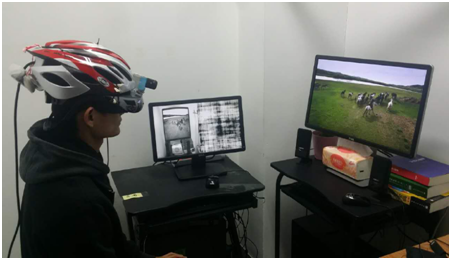
Ocular dominance plasticity has been and is still intensively investigated to understand and control adaptive neural plasticity. Reshaping ocular dominance beyond the critical period is difficult, but seems possible in adult humans. For example, after patching one eye for 2.5 hours the patched eye becomes more dominant during interocular competition.
It is widely accepted that the early visual neurons could be considered as "Fourier filters", analyzing the amplitude and phase of the input images. Since no pattern information is transmitted for the patched eye during patching, it is thought that the patched eye is deprived of both the Fourier amplitude and phase information. This raises a question what is the consequence of depriving the Fourier phase information alone?

The Experimental Scene (Image by IP)
Recently, Dr. BAO Min and his team from the Institute of Psychology of the Chinese Academy of Sciences and their collaborator Dr. HE Sheng from the Institute of Biophysics tested this idea.
To realize monocular deprivation of phase regularity, they developed a novel altered reality system. Binocular rivalry and interocular phase combination were measured before and after the simulated monocular patching and the monocular deprivation of phase regularity.
They found that both types of deprivations shifted the eye dominance to the deprived eye when measured with binocular rivalry. However, when measured with interocular phase combination, the phase deprivation showed no effects, while the effects were still observed for patching.
These results indicate that the two measurements are likely supported by different neural mechanisms. Phase integration requires the fusion of monocular images. The fused percept highly relies on the weights of the phase-sensitive monocular neurons that respond to the two monocular images.
However, binocular rivalry reflects the result of direct interocular competition that strongly weights the contour information transmitted along each monocular pathway. Monocular phase deprivation may not change the weights in the integration (fusion) mechanism much, but alters the balance in the rivalry (competition) mechanism.
The work demonstrates that depriving Fourier phase information alone is sufficient to alter the eye dominance, and suggests that ocular dominance plasticity may occur at different stages of visual processing.
Since natural stimuli differ little in their amplitude spectra, and phase is the predominant information on which our visual system relies to discern the world, the important role of phase in monocular deprivation thus likely reflects a consequence of biological evolution to accommodate signal processing of naturally occurring stimuli.
The results were published in Neuroscience with the title of "Monocular deprivation of Fourier phase information boosts the deprived eye’s dominance during interocular competition but not interocular phase combination".

86-10-68597521 (day)
86-10-68597289 (night)

52 Sanlihe Rd., Xicheng District,
Beijing, China (100864)

